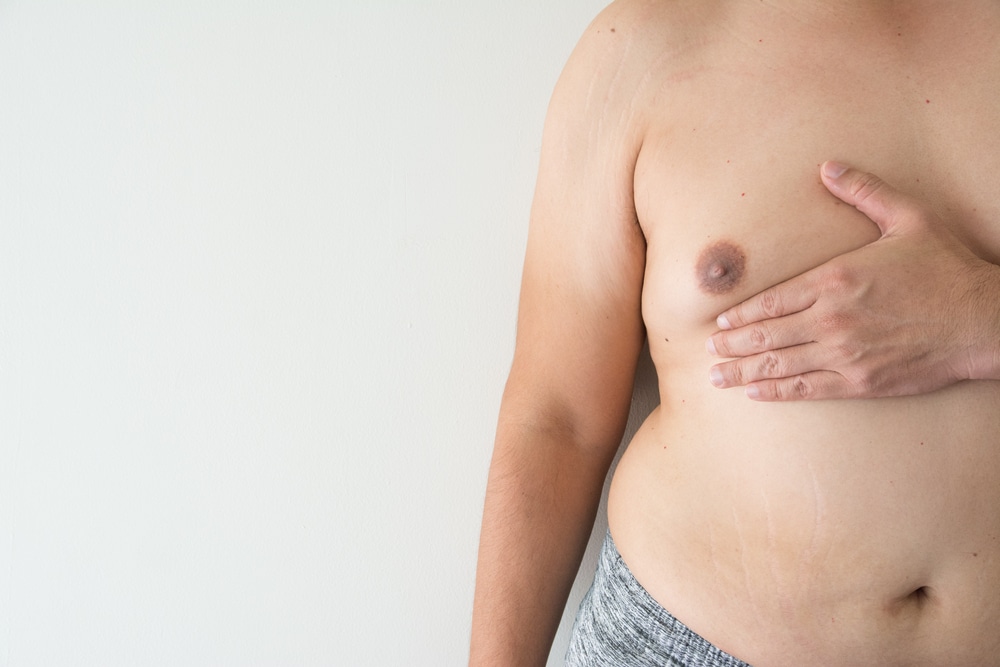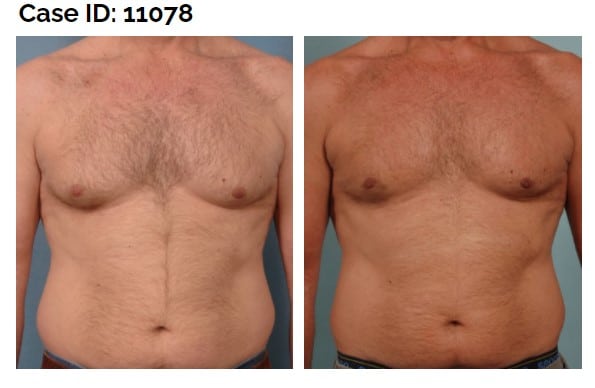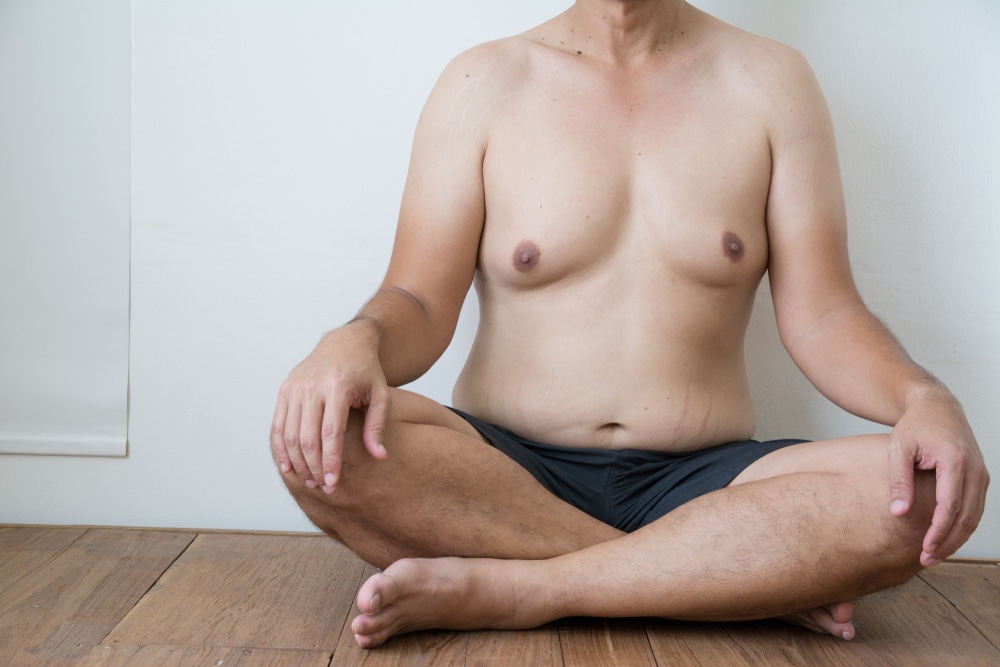*Individual results may vary
Gynecomastia, or enlarged male breasts, is a condition that affects men of all ages, often causing physical discomfort and emotional distress. For many, it leads to embarrassment and a loss of confidence in their appearance. If you are experiencing gynecomastia, you're not alone, and effective treatment is available.
At Dr. Mark D. Epstein's practice in Hauppauge, NY, we understand the significant impact this condition can have on your life.
Dr. Mark D. Epstein is a dual board-certified plastic surgeon with more than 25 years of experience, holding certifications from both the American Board of Plastic Surgery and the American Board of Surgery. His specialized training and extensive expertise in male breast reduction surgery make him a trusted and reliable expert for gynecomastia treatment. At our practice, we offer tailored care to help you restore your confidence and feel more at ease with your appearance.
What is Gynecomastia?
Gynecomastia is the enlargement of male breast tissue, typically resulting from hormonal imbalances. It can affect one or both breasts and may develop at any age—from adolescence to adulthood and 30 percent of men are affected by it within their lifetime. While it is not typically a serious medical issue, gynecomastia can significantly impact self-esteem and may even lead to physical discomfort, such as tenderness or pain in the chest.
- The most common causes of gynecomastia include:
- Hormonal fluctuations (high estrogen or low testosterone)
- Genetics
- Certain medications (such as steroids, anti-androgens, or antidepressants)
- Obesity or significant weight fluctuations
- The use of recreational drugs or alcohol

For many men, diet and exercise alone may not be enough to reduce the appearance of enlarged breasts, which is why professional treatment is often the most effective solution.
How Gynecomastia Treatment Works
Gynecomastia treatment, typically through male breast reduction surgery, is a highly effective way to reduce enlarged male breasts and restore a masculine chest.
1: Consultation
Dr. Mark D. Epstein will assess your condition, discuss your goals, and recommend a tailored surgical approach during your initial consultation.
2: Surgery
Performed under general anesthesia, the surgery typically lasts 1-2 hours. Dr. Epstein removes excess glandular tissue and fat and may use liposuction for contouring. Minimal scarring is typically hidden around the areola or chest folds.
3: Recovery
Patients go home the same day with a compression garment to reduce swelling. Initial recovery takes a few days, and full results are visible within weeks.
The Benefits of Gynecomastia Surgery
Gynecomastia surgery brings many advantages for men facing the physical and emotional impact of enlarged breasts. Some of the key benefits include:
- Improved Confidence: A flatter, more masculine chest can help you feel more confident in your appearance, whether at the gym, on the beach, or wearing fitted clothing.
- Physical Comfort: Gynecomastia often causes discomfort or tenderness in the chest for many men. Surgery can help relieve these symptoms by removing the excess tissue.
- Permanent Results: As long as a healthy lifestyle is maintained, the results of gynecomastia surgery are permanent, giving you peace of mind and lasting confidence.
Recovery Process and Potential Risks of Gynecomastia Surgery
After gynecomastia surgery, most patients experience a smooth recovery and a noticeable improvement in their chest appearance. The procedure is typically outpatient, allowing you to return home the same day.
Recovery Process
- First Few Days: You may experience some swelling, bruising, and mild discomfort after the procedure, but these symptoms can be easily controlled with prescribed medication. Wearing a compression garment will aid in minimizing swelling and provide necessary support to your chest during recovery.
- Light Activities: Most patients can resume light activities within 2-3 days, though strenuous exercise should be avoided for 4-6 weeks.
- Full Recovery: Swelling subsides within a few weeks, and most patients can return to full activities in 4-6 weeks.
Potential Risks
As with any surgery, gynecomastia surgery carries some risks, including infection, scarring, changes in nipple sensation, asymmetry, fluid accumulation, and anesthesia-related complications. Dr. Epstein takes every precaution to minimize these risks and will provide detailed post-op care instructions to ensure a safe recovery.
Check Out The Results We Can Deliver…

How Common Is Gynecomastia Among Men?
Gynecomastia is common and can affect males at various life stages. The National Institutes of Health (NIH) reports that gynecomastia affects 50-60% of adolescent boys and up to 70% of men aged 50-69.
How Does Alcohol Affect Gynecomastia?
Alcohol can contribute to gynecomastia development and severity.
Alcohol disrupts the endocrine system. This can lead to reduced testosterone production and increased estrogen levels. Increased estrogen levels, in turn, can cause an increase in breast tissue growth.
Chronic alcohol use can also interfere with proper liver function. This limits the liver's ability to metabolize estrogen. Improper metabolization may further elevate estrogen levels and promote gynecomastia.
How Does Gynecomastia Affect Mental Health?

Gynecomastia can have a severe impact on mental health. It often leads to feelings of embarrassment, self-consciousness, and diminished self-esteem.
Many men with gynecomastia may avoid social situations or activities that involve exposing the chest, such as swimming or changing in public.
This condition can also increase vulnerability to depression and anxiety. This is particularly true if it impacts daily life or social relationships.
How Can I Determine if My Enlarged Chest Is Due to Gynecomastia or Fat?
Distinguishing between gynecomastia and excess fat, often called "pseudogynecomastia," involves assessing physical characteristics and underlying causes. Here are some ways to identify the cause of chest enlargement:
- Feel and Texture: Gynecomastia is usually characterized by firm, rubbery glandular tissue located directly under the nipple area. It may feel denser than surrounding fat. In contrast, pseudogynecomastia caused by fat deposition generally feels softer. It is more evenly distributed across the chest as well.
- Nipple Sensitivity: Gynecomastia can sometimes cause tenderness or sensitivity in the nipple area. This is less common with fat accumulation alone.
- Location and Symmetry: Gynecomastia tends to occur symmetrically beneath both nipples, though it can sometimes affect just one side. Conversely, fat may appear more widespread across the chest without concentrating under the nipple.
- Hormonal and Lifestyle Factors: Gynecomastia is often associated with hormonal changes (puberty, aging, certain medications, or substance use such as alcohol or steroids). Excess fat may correlate more closely with body weight and lifestyle habits.
How Long Do the Results of Gynecomastia Surgery Last?
Gynecomastia surgery results are generally long-lasting. The procedure permanently removes excess glandular tissue and, sometimes, fat from the chest area. However, the longevity of the results depends on several factors:
- Lifestyle and Weight Maintenance: Significant weight gain after surgery can increase chest fat and alter the surgical outcome. Maintaining a stable, healthy weight helps preserve the results.
- Hormonal Balance: If the initial cause of gynecomastia was hormonal imbalances, ensuring these remain stable is essential. Lifestyle factors like limiting alcohol intake, avoiding certain medications, and staying active can help maintain hormonal stability.
- Avoiding Substances That Trigger Gynecomastia: The use of substances like anabolic steroids, recreational drugs, and alcohol can lead to a recurrence of gynecomastia even after surgery. Avoiding these helps preserve the chest's contour.
- Aging: Natural aging processes may result in minor changes to the chest area over time. However, these are usually less pronounced than the original gynecomastia symptoms.
Why Choose Dr. Mark D. Epstein for Gynecomastia Treatment?
Dr. Mark D. Epstein is a dual board-certified plastic surgeon with over 25 years of experience in cosmetic surgery, combining cutting-edge technology with artistic precision to achieve exceptional results. His extensive training includes fellowships in Reconstructive Microsurgery at Chang Gung Memorial Hospital in Taiwan, Hand Surgery at the Raymond Curtis Hand Center in Baltimore, and Microsurgery at Brigham and Women's/Harvard in Boston. He also completed a research fellowship at the Shriners Burns Institute.
Dr. Epstein is certified by both the American Board of Plastic Surgery and the American Board of Surgery, with an additional Certificate of Added Qualification in Surgery of the Hand. He is a Fellow of the American College of Surgeons and an active member of the American Society of Plastic Surgeons as well as the American Society for Aesthetic Plastic Surgery.
Patients in Hauppauge, NY, trust Dr. Epstein for his expertise, honed over decades of experience performing gynecomastia surgery. He offers compassionate, personalized care, listening carefully to each patient's concerns and crafting a treatment plan tailored to their needs. His state-of-the-art facility ensures the highest level of safety and comfort, making Dr. Epstein's practice the preferred choice for gynecomastia treatment.
Reclaim Your Confidence in Hauppauge, NY
If you're interested in learning more about male breast reduction surgery or want to find out if you're a suitable candidate, schedule a consultation with highly skilled plastic surgeon Dr. Mark D. Epstein today! Call 631.689.1100 or click here to submit an Email Contact Form. We look forward to serving you!

